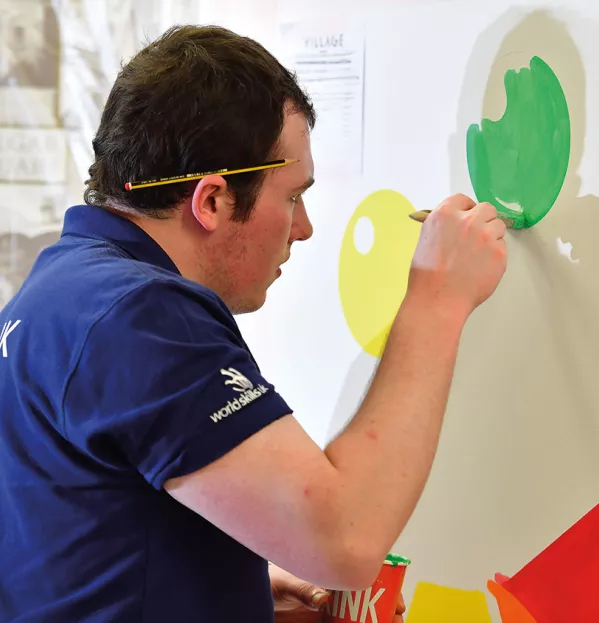In the race to become a world champ, losing is a valuable life lesson

At The Manchester College, three car bonnets are being prepared for a painted motif of Rio de Janeiro’s iconic Christ the Redeemer statue. In another corner, three young aircraft-maintenance competitors have completed work on an RAF helicopter and are anxiously awaiting assessment of their work.
Meanwhile, down the road at Trafford College, four patisserie and confectionery students are creating large sugar structures, just down the corridor from where jewellery competitors are working on gold pendants.
It’s the week of the selection event to find out who will make up Team UK for the WorldSkills competition in Abu Dhabi this autumn. Last week, 70 current and former apprentices and college students gathered at colleges across Greater Manchester to fight it out for the opportunity to represent their country in the flagship international skills competition.
For the competitors, this is the culmination of years of training and thousands of hours spent honing their skills. Now, with the competition over, all they can do is wait for the announcement on 21 April to find out whether they have done enough to earn a place on the plane to the United Arab Emirates.
A prime example of the sheer determination to secure one of those coveted places is floristry competitor Danielle Scandone. The EuroSkills silver medallist from Gothenburg cut herself so badly early on in the team-selection contest that she required hospital treatment. As soon as she was bandaged up, she was back at the competition to try to win her WorldSkills place.
Three years’ preparation
Not everyone has a rival to compete with, though. In auto body repair, Andrew Gault only has a guest competitor from India for company. But he still has to meet the minimum WorldSkills standards to claim a place at the biennial international contest.
Frazer Minskip, the WorldSkills UK expert in the field, says that Gault has been “the perfect competitor”.
“He has committed to every training session, has gone into his college on Saturdays and Sundays,” he says. “That is a WorldSkills competitor. He communicates really well and is happy to say he needs help.”
For Gault, qualifying for Team UK would “mean everything”, Minskip adds. “He has had nearly three years in training and three years for a 20-year-old is a long time.”
Over in aircraft maintenance, the five competitors in the reckoning earlier this year have been whittled down to three. Martin Yates, the aircraft-maintenance expert who has worked with all of them, says there is little to choose between the finalists.
“They are all better engineers and more broad-minded people than when they started. I am content with that,” he says. “For the one who gets to go, it is massively exciting. When they come back from Abu Dhabi, they will realise it has changed their life.”
Philip Broodbank, one of the three, says the nerves did not kick in until after the competition had ended. “I have trained at least a week every month and my employer has been really supportive,” he says. “I spent the last week before coming here in college, just getting ready.”
Fellow competitor William Hughes has also put in the hours: “It has been quite intense. They told us there would be quite a lot of training, but I didn’t think it would be quite this much.”
The resilience this has taught him, he says, will help him “in every aspect of life”.
In addition to training from the skills experts, the young competitors also receive support from performance coaches to ensure that they are ready for the stress of taking to an international stage.
Competition coaching
Hayley Edwards is a volunteer support coach and former competitor, and was responsible for the wellbeing of competitors in four skill categories during team selection. This could include anything from dietary advice to sessions on how to deal with stress, she says.
WorldSkills may be informally known by many as the “skills Olympics”, but one performance coach actually has Olympic experience. Peter Bakare, who competed for Great Britain in the 2012 London Olympics volleyball competition, believes that there are many parallels.
“I help the competitors with motivation and goal setting,” he says. “They have been training for a long time for this. Training for the Olympics and training for [WorldSkills] are quite similar. They spend so much time training and then, on the day, everything can hang on this one performance and they have to put everything into that.”
Even for those who fail to qualify for Abu Dhabi, the benefits of the skills competition will last a lifetime, according to The Manchester College principal Lisa O’Loughlin. The skills acquired will prove to be hugely beneficial - not least, learning how to lose.
“Losing is a very valuable life lesson,” she says. “You are not going to be the best in the world every time.”
You need a Tes subscription to read this article
Subscribe now to read this article and get other subscriber-only content:
- Unlimited access to all Tes magazine content
- Exclusive subscriber-only stories
- Award-winning email newsletters
Already a subscriber? Log in
You need a subscription to read this article
Subscribe now to read this article and get other subscriber-only content, including:
- Unlimited access to all Tes magazine content
- Exclusive subscriber-only stories
- Award-winning email newsletters